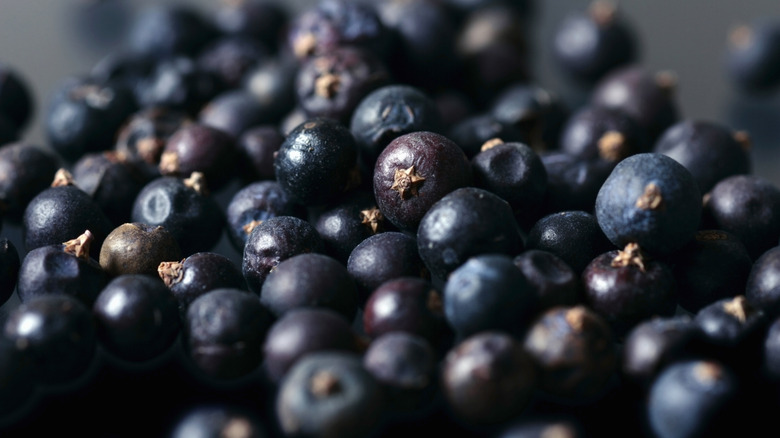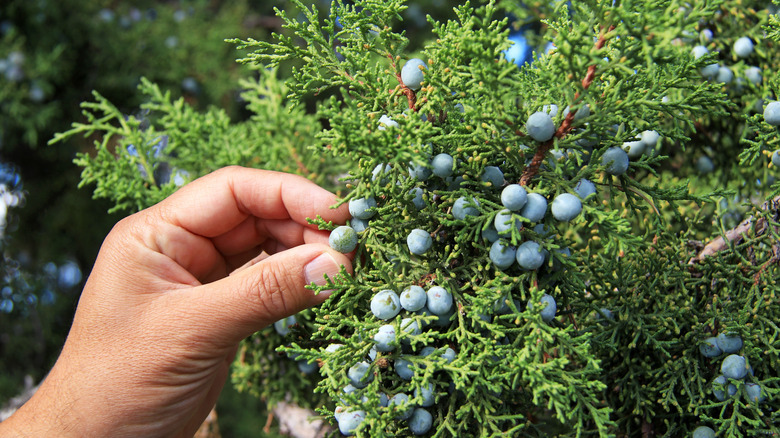This Unexpected Berry Is The Key Ingredient In Chipotle Carnitas
Carnitas are Chipotle's only permanent pork offering on its menu, but one thing you might not know is that its version isn't exactly a traditional one. For starters, the carnitas at Chipotle are cooked in a slightly different manner than is traditional. Mexican carnitas are typically braised and then crisped up in their own fat, but according to Chipotle's website, its version is always simply braised, then shredded by hand — no lard-based crisping involved.
The cooking method is one thing, but there's also a difference in the way Chipotle seasons its pork. Some traditional recipes use a combination of onion, garlic, dried oregano, oranges (sour ones, if you can get them), and various other herbs and spices, but Chipotle's version opts for a unique blend of salt, black pepper, thyme, ground bay leaf, and most interesting of all, cracked juniper berries. The juniper berries are the true outlier, because they're often associated with a certain spirit that's not related to carnitas whatsoever.
Juniper berries are a key ingredient in gin
Aromatic juniper berries have a very concentrated, pine-like flavor with a strong spice component. In fact, they're what give gin its distinctive and complex flavor, in case you're wondering why the mere mention is making you crave a martini (in case you're curious, here's how to mix one like Winston Churchill). That's why Chipotle's choice in using juniper berries is a bit of a swerve. Pine notes aren't exactly a taste you imagine when you think of a pork dish, but where gin is concerned, that's probably the first flavor you think of.
In terms of the drink, the flavor of juniper berries is added during the distillation process. First, a neutral, vodka-like spirit is created, and then a second distillation with juniper berries and other aromatics helps capture their essential oils, lending the alcoholic beverage its signature taste (here's our guide to gin if you want to climb further up the pine tree of pleasure). As to why Chipotle uses juniper berries, the company's ingredients page says it prefers them for their "distinct, pungent flavor and aroma that stands up to rich, meaty dishes." If you can describe carnitas as anything, they're certainly rich and meaty.
Where do juniper berries come from, and how else are they used in cooking?
The name "juniper berries" is slightly misleading in that they're not berries at all. Rather, they're female seed cones from the juniper tree, which is a conifer — hence the piney flavor. Yep, they're technically cones, just a rather round and fleshy sort, which is why we default to calling them berries.
Other than gin and Chipotle's one-off carnitas recipe, juniper berries are commonly found in German food, appearing in dishes like sauerkraut and pickles. They're also used to season things like roasts and game meats. A French Alsatian dish called choucroute garnie, which is a sauerkraut preparation with various meats and sausages, always uses juniper berries as part of its seasoning.
If you're curious where to get them, you can purchase juniper berries whole and dried at grocery stores such as Whole Foods, but you can also buy them online from major retailers like Amazon. I wouldn't recommend you forage for them since a small number of juniper trees bear toxic berries, and most of the rest are so bitter that they're unusable for cuisine. If you're going out of your way to get them for your own carnitas, that's probably not necessary — we have a three-ingredient carnitas recipe that couldn't be easier, with no juniper berries involved. If you've ever wondered, though, why Chipotle's version tastes different than others, it just might have something to do with a coniferous tree.


